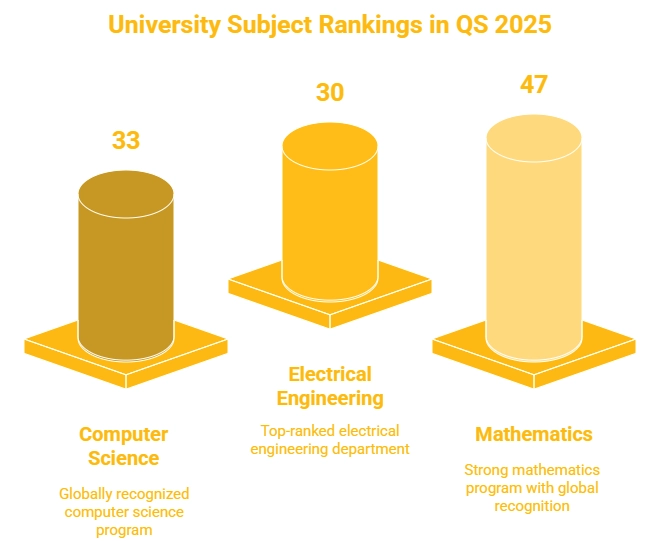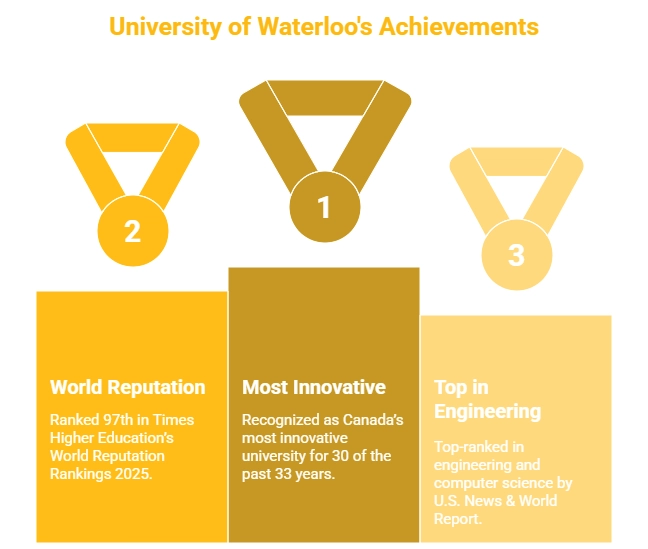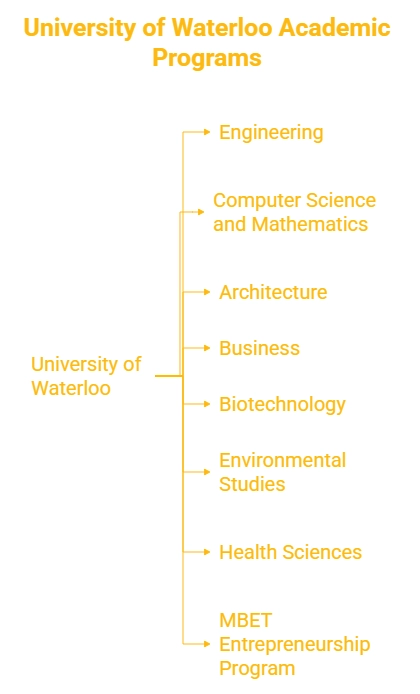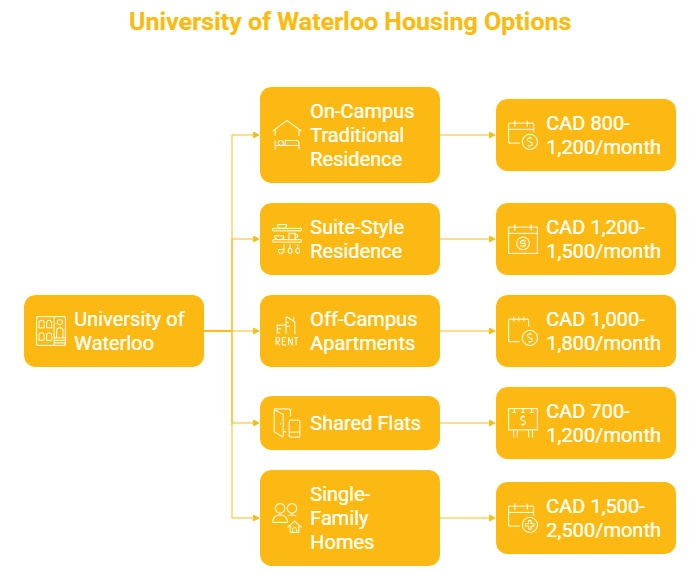Established in 1959 and situated in Ontario, Canada, the University of Waterloo is a highly regarded research institution celebrated for its commitment to innovation, entrepreneurship, and experiential learning. It hosts the largest co-operative (co-op) education program in Canada, providing students with paid work opportunities that are integrated into their academic schedules, particularly excelling in the fields of engineering, computer science, and mathematics.
The university's alumni have launched notable startups, such as Wish and Instacart, and it is recognized as the leading institution in Canada and ranks 21st globally based on the number of founders per PitchBook.
QS World University Rankings 2025: Ranked 115th globally and 5th in Canada.
Subject Rankings:

Additional Distinctions:

The University of Waterloo has a moderately selective undergraduate acceptance rate of approximately 53%. However, the competitiveness of admission varies by program, with fields such as Engineering, Computer Science, and Mathematics requiring higher academic standards and potentially necessitating supplementary applications, interviews, or portfolios.
For international undergraduate students, particularly those from the UK, tuition fees differ by program:
| Programme / Faculty | Annual Tuition Fee (CAD) | Annual Tuition Fee (GBP*) | Notes |
| Engineering | 58,000 – 73,000 | ~£34,500 – £43,500 | Includes programmes like Civil, Mechanical, Electrical, Software Engineering; among the highest due to lab & equipment costs |
| Computer Science | 55,000 – 68,000 | ~£32,800 – £40,600 | Competitive entry; co-op option available |
| Mathematics & Statistics | 45,000 – 56,000 | ~£26,800 – £33,400 | Includes Actuarial Science, Data Science |
| Science | 45,000 – 55,000 | ~£26,800 – £33,000 | Biology, Chemistry, Physics, Environmental Science |
| Health Sciences | 46,000 – 54,000 | ~£27,400 – £32,200 | Kinesiology, Public Health, Health Studies |
| Arts & Humanities | 38,000 – 48,000 | ~£22,600 – £28,500 | Psychology, Sociology, History, Languages |
| Environment | 38,000 – 48,000 | ~£22,600 – £28,500 | Planning, Geography, Environmental Studies |
| Architecture | 43,000 – 53,000 | ~£25,600 – £31,500 | Design studios, field trips may add extra costs |
| Graduate Programmes (Course-based Master’s) | 30,000 – 50,000 | ~£17,800 – £29,800 | Business (MBET, MAcc), Computing, Engineering |
| Graduate Programmes (Research Master’s/PhD) | 25,000 – 40,000 | ~£14,800 – £23,800 | Tuition often lower due to research funding/assistantships |
The University of Waterloo provides a diverse array of academic options, offering over 100 undergraduate and more than 150 graduate programs across six faculties. Notable areas of study include:

A variety of scholarships are available, particularly for international students:
Additional faculty-specific and program-specific awards may also be available.
On-campus housing is available across eight primary residences, ranging from larger facilities such as UW Place (accommodating over 1,300 students) to smaller halls like Minota Hagey (approximately 70 students). Living costs vary significantly:

Step 1: Choose a program. Look at the course pages to see what you need to take beforehand, co-op choices, and any notes about the subject.
Step 2: Check what you need to get in and the English rules. Make sure your UK grades (A-levels/IB) meet what the program wants, and if you need to send IELTS/TOEFL/Duolingo scores.
Step 3: Remember when things are due. For the fall, the OUAC deadline is usually in late January. Check OUAC and your program pages for the exact dates.
Step 4: Get your papers ready. Collect your school records (or expected grades), passport, and any portfolio or test scores the program needs. If you get in, you usually need to send final official records later.
Step 5: Make an OUAC account and start your application. Pick up to the number of Waterloo programs allowed and check the co-op box if you want to do co-op. Pay the OUAC fee and send it in.
Step 6: Fill out the Waterloo extras (AIF, portfolio, video interview) if needed. You'll get instructions in your Waterloo applicant area (Quest) after Waterloo receives your OUAC application. The AIF is needed for many Engineering and Math programs.
Step 7: Send test scores and official papers. Ask for official English test scores and records to be sent directly as told. Watch for them in your applicant area.
Step 8: Monitor your application status on the Waterloo applicant portal and respond to any requests promptly via email, watching out for added document requests or deadlines.
Step 9: Offers will be either conditional or unconditional. Read the conditions for grades, transcripts, and English scores carefully.
Step 10: Accept offers via OUAC, or according to Waterloo’s instructions on the portal.
Graduate Application Steps
Step 1: Select a program, noting its courses, research, and funding information.
Step 2: See if your program requires a supervisor before application by checking departmental guidance, as some programs do.
Step 3: Prepare application materials such as transcripts, CV, statement of purpose, reference contact details, English test scores, and any GRE/GMAT scores if needed.
Step 4: Create an account on the Waterloo Graduate Applicant Portal, complete the online application forms, upload documents, and pay the application fee shown on the portal.
Step 5: Submit referee details so they can submit references by the deadline.
Step 6: Track your application in the portal and add any extra items if asked.
Step 7: Departments may review and conduct interviews or ask for sample work.
Step 8: Decisions will come with funding, start-date, and any stipulations as needed.
Step 9: Accept the offer and pay any deposit, in accordance with faculty instructions on the letter and application portal.
Next Steps for International Students after Receiving an Offer
Step 1: Accept the offer via OUAC or the applicant portal once you read the conditions.
Step 2: Pay the tuition deposit to proceed with post-offer actions like requesting a Provincial Attestation Letter. Amounts and deadlines are in the offer instructions.
Step 3: Request a Provincial Attestation Letter (PAL) via Quest, as most international student study-permit applications need one from the province after you accept and pay the deposit if asked.
Step 4: Apply for your Canada study permit (IRCC) using your Letter of Acceptance, PAL, proof of funds, biometrics, and other documents. Processing times vary by country, so start early.
Step 5: If you’re in a co-op program, for work placements on campus, apply for a co-op work permit, often together with your study permit.
Step 6: Reserve accommodation, and apply for campus residences through Waterloo Campus Housing, or make off-campus arrangements.
Step 7: Before you travel, set up Waterloo email and Quest accounts, check health insurance, plan finances, and arrange travel and lodging, using International Orientation and online resources for guidance.
Step 8: Upon arrival, attend orientation, register for classes, apply for a SIN, and your study/co-op permits are in order before starting any paid work.